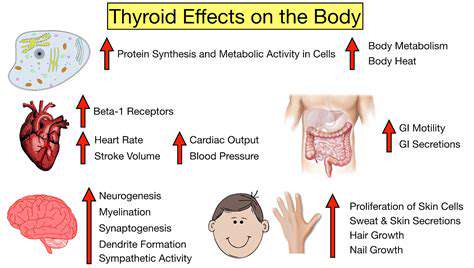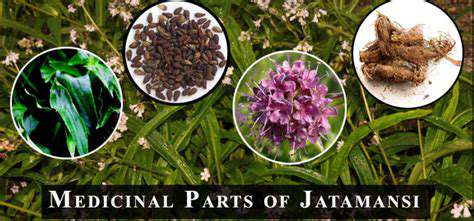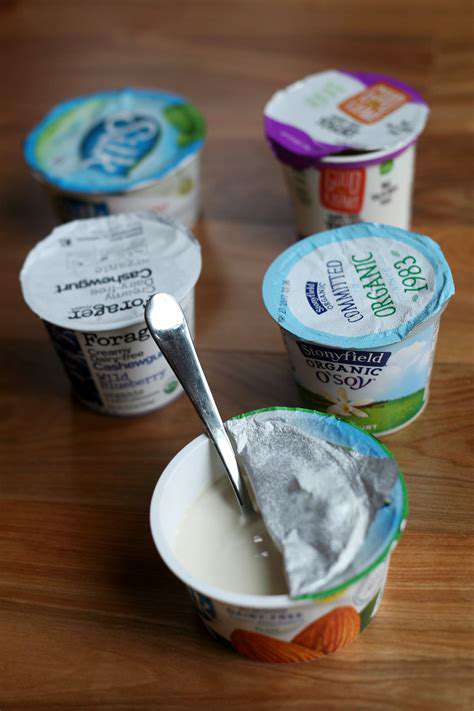The Benefits of Whole Grains for Gut Health
Dietary Fiber and Gut Microbiome
Dietary fiber plays a crucial role in supporting a healthy gut microbiome. This complex carbohydrate, found predominantly in plant-based foods, isn't digested by the human body. Instead, it serves as a vital food source for the trillions of beneficial bacteria residing in our intestines. These bacteria ferment the fiber, producing short-chain fatty acids (SCFAs) like butyrate, acetate, and propionate. These SCFAs are essential nutrients for the gut lining, promoting its health and preventing inflammation. A diverse and thriving gut microbiome is linked to improved digestion, nutrient absorption, and overall well-being.
The variety of fiber types is important. Soluble fiber, found in oats, beans, and fruits, forms a gel-like substance in the digestive tract, helping to slow down digestion and regulate blood sugar levels. Insoluble fiber, found in whole grains, vegetables, and seeds, adds bulk to the stool, promoting regularity and preventing constipation. Both types of fiber are necessary for maintaining a healthy gut environment and contribute to overall digestive health.
Fiber's Role in Preventing Diseases
Studies have consistently shown a strong link between a high-fiber diet and a reduced risk of various diseases. Fiber's ability to regulate blood sugar levels can significantly lower the risk of type 2 diabetes. By promoting regularity and preventing constipation, fiber can also reduce the risk of diverticulitis and other digestive issues. Furthermore, the production of SCFAs by fiber-fermenting bacteria has been associated with a reduced risk of certain types of cancers, cardiovascular disease, and obesity. A diet rich in fiber is a cornerstone of a healthy lifestyle and a preventive measure against many chronic diseases.
Fiber's impact on cholesterol levels is another important aspect of its role in disease prevention. Soluble fiber can bind to cholesterol in the digestive tract, preventing its absorption into the bloodstream and helping to lower LDL (bad) cholesterol levels. This effect is particularly beneficial for maintaining cardiovascular health and reducing the risk of heart disease. A diet rich in fiber can thus contribute to a healthier cardiovascular system.
Whole Grains: A Fiber-Rich Food Source
Whole grains are an excellent source of both soluble and insoluble fiber, making them an important component of a healthy diet focused on gut health. Unlike refined grains, which have been stripped of their bran and germ, whole grains retain the fiber-rich outer layers. This intact structure ensures that the grain provides a range of nutrients and promotes satiety, contributing to a balanced and healthy diet. Whole grains such as brown rice, quinoa, and whole wheat are excellent choices for incorporating more fiber into your meals.
Choosing whole grains over refined grains offers more than just fiber benefits. Whole grains are often packed with vitamins, minerals, and antioxidants that support overall health. By including whole grains in your diet, you're not just improving your gut health, but also providing your body with essential nutrients to support a variety of bodily functions. This makes whole grains a valuable addition to a balanced and nutritious diet.
Prebiotics for a Thriving Microbiome
Understanding Prebiotics
Prebiotics are a type of dietary fiber that acts as food for beneficial bacteria in your gut. These friendly bacteria, often referred to as probiotics, play a crucial role in maintaining a healthy digestive system. Prebiotics are not digested by your body in the small intestine, instead they travel to the large intestine where they are fermented by these beneficial bacteria. This fermentation process provides energy for the growth and activity of these good bacteria, fostering a thriving and balanced gut microbiome.
Essentially, prebiotics are like fertilizer for your gut bacteria, promoting their growth and activity. By feeding these beneficial bacteria, you are supporting a healthy digestive system, which has wide-ranging effects on your overall well-being.
Prebiotics and Whole Grains: A Powerful Combination
Many whole grains are excellent sources of prebiotics. The complex structures and fiber content of whole grains, unlike refined grains, are not completely broken down during digestion. This means a significant portion of the fiber reaches the large intestine, where it serves as a crucial food source for the beneficial bacteria in your gut.
The presence of prebiotics in whole grains contributes to a healthier gut microbiome, supporting a balanced ecosystem of bacteria that are vital for overall health and well-being. This balanced gut microbiome, in turn, can have a positive impact on various aspects of your health.
The Role of Fiber in Gut Health
Fiber, a crucial component of whole grains, plays a vital role in promoting gut health. Dietary fiber is not digestible by the human body, meaning it passes through the small intestine largely intact. This undigested fiber then reaches the large intestine, where it becomes a source of nourishment for the beneficial bacteria residing there.
This fermentation process produces short-chain fatty acids (SCFAs), which are essential for maintaining a healthy gut lining and overall digestive function. The presence of sufficient fiber in your diet, particularly from whole grains, is essential for maintaining a healthy gut microbiome.
Beyond Digestion: The Impact on Overall Health
The positive effects of a healthy gut microbiome extend far beyond simple digestion. A thriving gut microbiome is linked to improved immune function, reduced inflammation, and even better mental well-being. Studies suggest that a balanced gut microbiome can contribute to a stronger immune response, helping your body fight off infections more effectively.
Additionally, a healthy gut microbiome can influence your body's response to inflammation, potentially reducing the risk of various inflammatory conditions. The impact of a healthy gut on mental well-being is also a growing area of research, with some studies suggesting a connection between gut health and mood regulation.
Whole Grains and Gut Microbiome Diversity
A diverse gut microbiome is a healthy gut microbiome. Whole grains, with their varied fiber content, contribute to a more diverse gut microbiome. Different types of fiber in whole grains feed different types of beneficial bacteria, promoting a richer and more balanced ecosystem within your gut.
This diversity is crucial for optimal gut health. A diverse microbiome is better equipped to handle a range of dietary challenges and maintain a stable and resilient environment for digestive processes. Encouraging this diversity through a diet rich in whole grains is a significant step towards improving overall gut health.
Choosing Whole Grains for Optimal Gut Health
When choosing whole grains, opt for options like brown rice, quinoa, oats, and barley. These whole grains are rich in fiber and offer a variety of nutrients that support the growth and activity of beneficial bacteria in your gut. Look for whole grain products that list the whole grain as the first ingredient in the ingredient list.
By incorporating a variety of whole grains into your diet, you're not only providing your body with essential nutrients but also supporting a healthy gut microbiome. This proactive approach to gut health can lead to numerous benefits, from improved digestion to enhanced overall well-being.











